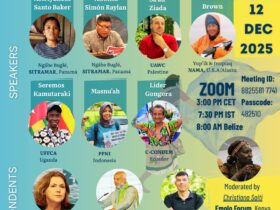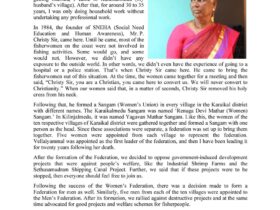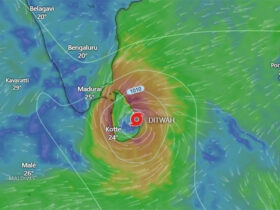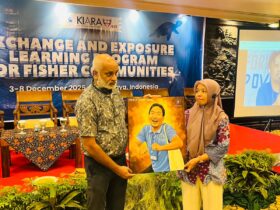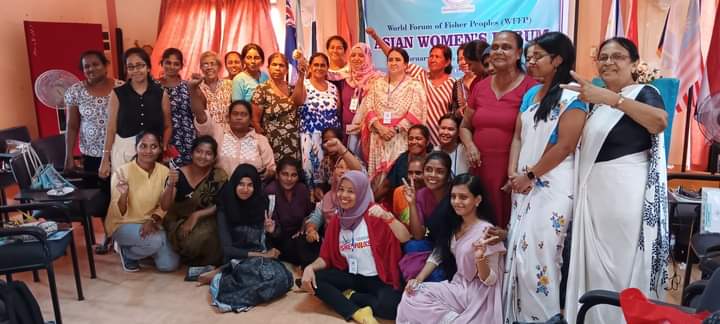WFFP ASIAN WOMEN’S FORUM
The Asian Women’s Forum met on 26 January 2024 at the NAFSO Auditorium at No.10, Malwatta Road, Negombo, Sri Lanka with 13 representatives from 7 Asian countries. They were: Rashieda Begum and Sanat Bowhmic (Banglasesh); Jesu Rethinam and Ramakrishna Tandel (India); Miftahul Khausar, Esra Dwi Lestari and Masnuah from Indonesia; Azrilnizam Omar (Malaysia); Yasmeen Shah (Pakistan), Pablo Rapesa Rosales Jr .and Evangelina C. Gonzales from the Philippines; Ravadee Prasertcharoensuk and Chatjaporn Loyplaw from Thailand. These Asian Women’s Forum members were already in Sri Lanka as they came to attend the Asia Pacific Regional Advisory Group (RAG) Meeting held in Colombo. The WFFP International Secretariat used this opportunity to organize the one-day Asian Women’s Forum in order to save costs on air travel of participants. Thirty-five women representing local fisher women’s organizations also joined this forum.
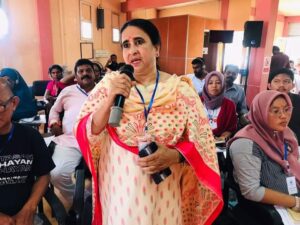 Following the performance of the traditional welcome of participants on arrival, they were officially welcomed by Mr. Herman Kumara, General Secretary of WFFP. The political process that is expected to be deliberated at the WFFP’s 8th General Assembly in Brazil in November was shared. The overall aim of the WFFP is to advance the global struggle of small-scale fisher people through collective analysis, enhance knowledge, solidarity building and empowerment of members through strengthening their political and organisational capacity.
Following the performance of the traditional welcome of participants on arrival, they were officially welcomed by Mr. Herman Kumara, General Secretary of WFFP. The political process that is expected to be deliberated at the WFFP’s 8th General Assembly in Brazil in November was shared. The overall aim of the WFFP is to advance the global struggle of small-scale fisher people through collective analysis, enhance knowledge, solidarity building and empowerment of members through strengthening their political and organisational capacity.
The objective of holding this event was to give an understanding and encourage the Asian Women’s Forum members to come prepared to contribute strongly at the Women’s Assembly which will take place on 15th November 2024 before the meeting of the General Assembly in Brazil, on the three following themes which have been highlighted in all previous WFFP general assemblies:
- Food Sovereignty – ‘the solution we want’
- Ocean Grabbing – ‘the threat we struggle against’
- The Climate Crisis
The expectations of the political process based on the above three themes were clearly defined as follows:
Food Sovereignty is what WFFP wants! Food sovereignty is different from food security in both approach and politics. Food security does not distinguish where food comes from, or the conditions under which it is produced and distributed. National food security targets are often met by sourcing food produced under environmentally destructive and exploitative conditions, and supported by subsidies and policies that destroy local food producers but benefit agribusiness corporations.
.On the other hand, food sovereignty is the right of peoples to healthy and culturally appropriate food produced through ecologically sound and sustainable methods, and their right to define their own food and agriculture systems. Food Sovereignty is a political agenda of small-scale food producers in the defence of rivers, lakes, oceans and land.
The WFFP wants to influence the UN bodies and other organizations against the encroachment into our food system, approaching in the context of fisheries, they seek to privatize and consolidate fishing rights in the hands of a few multinational corporations. The principles of Food Sovereignty are intertwined with the UN small-scale fisheries guidelines which was endorsed by the UN in 2014 and this year we are commemorating the 10th year of the victory achieved by WFFP.
Ocean Grabbing was coined as a term by the WFFP in 2014. WFFP perceives ocean and land grabbing as a development that leads to the eviction of fisher communities from their territories and resources and negatively impacts on the environment. In recent years, ocean and land grabbing has accelerated as a direct result of the expansion of extractive industries such as mining, oil and gas; continuation of destructive industrial fishing, construction of big infrastructure projects including water ways, wind farms, land based transport ways, pipelines, smart cities, port construction and reclamation projects.
At the 8th general assembly, WFFP will also discuss and assess how ocean grabbing has manifested itself since the general assembly in Delhi 2017 and develop new strategies as follows:
- How to protect the rights of fisher peoples;
- Seek restoration and restitution in the light of ocean grabbing where it has manifested itself ; and
- Be vigilant as to where it is likely to take place in the near future.
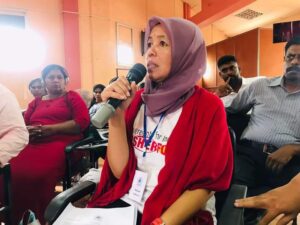 When it comes to the climate crisis, small-scale fisher communities are at the front lines bearing the brunt of impacts from climate change such as natural disasters, sea level rise, sea erosion and impacts on fish stocks. The livelihoods of fishers are under threat but the issues of fisher peoples are minimally represented in the national or international level discussions on climate justice. WFFP has participated in many UN Climate Conferences, but no consideration is given to our demands. In the light of the ever increasing threats from climate change, WFFP continues to highlight the impacts faced by fisher peoples and advocate for solutions that are developed and articulated by fisher peoples.
When it comes to the climate crisis, small-scale fisher communities are at the front lines bearing the brunt of impacts from climate change such as natural disasters, sea level rise, sea erosion and impacts on fish stocks. The livelihoods of fishers are under threat but the issues of fisher peoples are minimally represented in the national or international level discussions on climate justice. WFFP has participated in many UN Climate Conferences, but no consideration is given to our demands. In the light of the ever increasing threats from climate change, WFFP continues to highlight the impacts faced by fisher peoples and advocate for solutions that are developed and articulated by fisher peoples.
Written by-Freiddie Jayawardena

